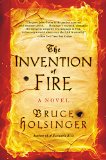Summary | Excerpt | Reviews | Beyond the Book | Readalikes | Genres & Themes | Author Bio

I retraced my steps to the stairs before Newgate and descended into the narrow ways of St. Martin, the small parish spread between St. Paul's and the wall. My whole day had been spent floating above London, with scarcely a thought for the eternal squalor below, though descending now to the close streets I knew so well came almost as a relief, despite the fatigue of a long and trying day. I walked nearly to the cathedral before turning to approach Ludgate from the east, angling around the gateyard to avoid repair work on the conduit ditch, which looked to have sprung a leak. At the corner of the yard I bought three bird pies and a dipper of ale.
From the pillory holes in the yard dangled the hands of Peter Norris, a parchment collar affixed to his neck, his uncovered hair lifting morosely with each gust of wind. He must have been in place for hours already, as the area was free of hasslers. A boy of about eleven sat at the foot of the stocks, faking a cough.
Norris's eyes were to the ground as I approached. His unshaven neck rasped against the parchment collar, inscribed in high, dark letters with his crime: I, Peter Norris, stole pigeons. His was quite a fall, for Norris had been a powerful man in former days, a wealthy mercer with nearly exclusive command of the city's silk trade with France, though that was before he would be brought low by his own poor decisions.
"Norris," I said, handing two pies to the boy and holding one out to his father's mouth.
As the boy started to eat Norris made an effort to turn his head, angling his gaze up to meet my own.
"Spit that out, Jack!" Norris commanded weakly when he saw me. The boy stopped chewing, his eyes gone wide. "John Gower here's like to poison you dead, without a thought for your boy's soul." I sniffed. "Not today, Norris."
I glanced at his son. The boy, twig thin, wore a woolen cap, his golden hair stuffed beneath the narrow brim. The cap had ridden up slightly, exposing ugly stumps where his outer ears had once been. A cutpurse, then, caught knifing and sliced for his crime. He took a few coins from my hand and wandered off toward the gate, both pies already gone.
Norris looked after his son as long as he could, neck straining against the skin-slicked wood. "That boy, he's a loyal one, he is. He's got as much rot thrown in the face this week as his father, with no fuss about it, and sits here with me all through the day. 'The Earl of Earless,' they taunt him on account of his stubs. Worse things, too." He shook his head.
"Can he hear it all?" I asked, curious about the boy's affliction, thinking of my own.
"Oh, young Jack hears what he wants to hear, as all boys do." He laughed fondly.
Norris, I realized as I followed the boy's progress, had a perfect angle on the traffic into the city from Ludgate. Beyond the imposing façade lay the legal precincts and the royal capital. An important city entrance, bringing visitors and goods from Temple Bar, the inns, and finally Westminster a good walk up the Strand.
"How long have you been at the pillory, Norris?" I held the cup for him.
He took a slow sip of ale, smacked his lips. "Since the dawn bell," he murmured. Another sip. "But an hour and a bite and I'm free, for all that's worth."
"This is the last day of your sentence?"
"Aye."
"And the rest of it?"
"Ten hours in a day right through a week, as was my sentence at the Guildhall, and all for a festering brace of pigeons swiped and sold to a pieman! Constable wouldn't have taken me in at all, if an alderman's daughter hadn't happened to stomach one and empty her guts." He looked out at one hand, then the other. "Give me Jesu's cross over the pillory. A man's not meant to stand bent this long."
He was right about that. Though the punished generally stood at the stocks for no more than an hour at a time, the longer sentences could lead to permanent disfigurement. Pillory back, its sufferers easily identifiable by their crooked spines and frequent grunts of pain as they hobbled through the streets.
Excerpted from The Invention of Fire by Bruce Holsinger. Copyright © 2015 by Bruce Holsinger. Excerpted by permission of William Morrow. All rights reserved. No part of this excerpt may be reproduced or reprinted without permission in writing from the publisher.




A book is one of the most patient of all man's inventions.
Click Here to find out who said this, as well as discovering other famous literary quotes!
Your guide toexceptional books
BookBrowse seeks out and recommends the best in contemporary fiction and nonfiction—books that not only engage and entertain but also deepen our understanding of ourselves and the world around us.